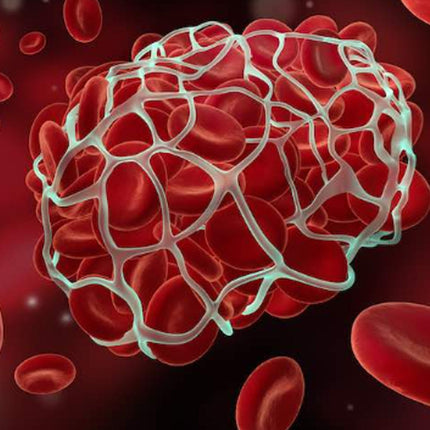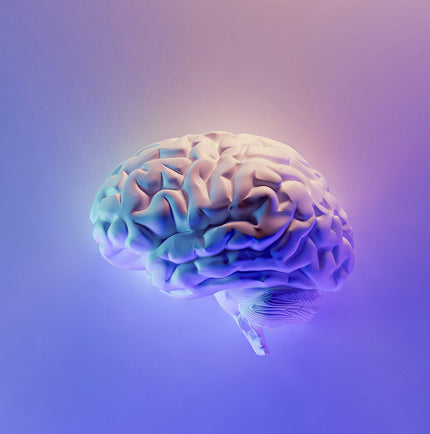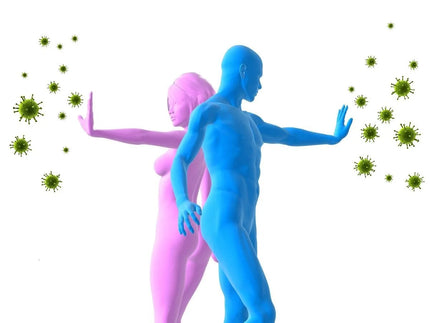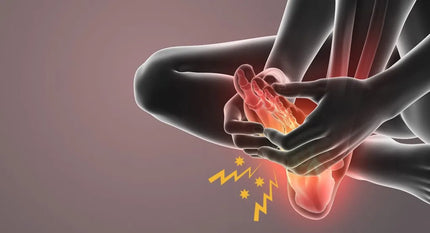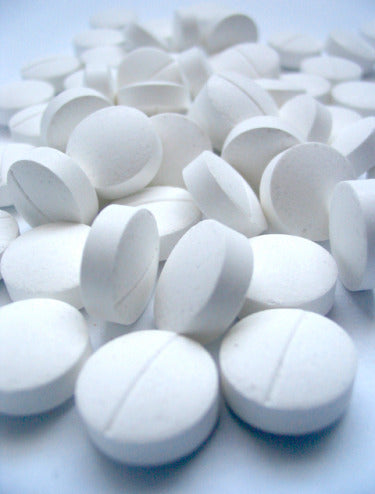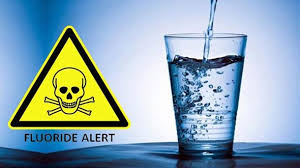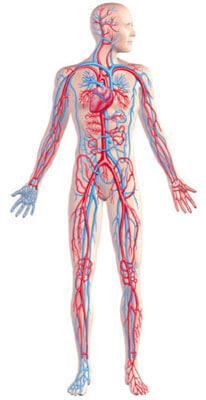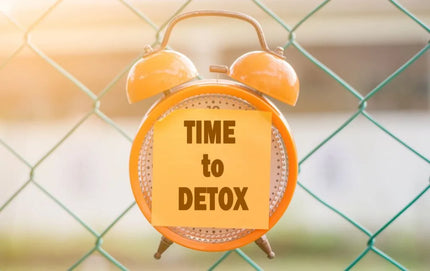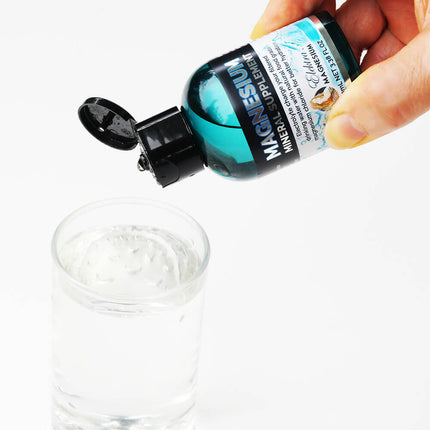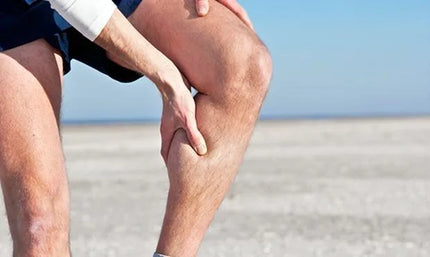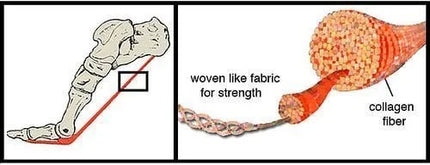Tax included and shipping calculated at checkout
Overtraining syndrome is a constellation of symptoms resulting from chronic training above the body's capacity for recovery. It basically means you are taking out more than you put into the body’s resources, and it can easily happen if you get carried away chasing more and more of those euphoric brain endorphins (highs) from exercise. Overtraining syndrome puts you in energy and nutritional deficit, which then causes systems breakdowns and malfunctions. It can occur in both high-volume training regimens such as swimming, football and cycling, as well as high-intensity training regimens like weightlifting.
The syndrome starts with milder symptoms of ‘overreaching’, which include fatigue, foggy brain and loss of motivation. When the body becomes physically depleted, the brain begins to experience motivational fatigue, which affects decision-making and moods. Stress responses become more acute, we become hypersensitive, and it can also trigger hormonal swings and imbalances.
Overreaching can be a temporary stage, corrected with rest and adequate nutrition. If not corrected, overreaching can escalate into ‘overtraining syndrome’, a more chronic and serious state of depletion and health deterioration. (Roy, 2015)
Symptoms of overtraining syndrome are the same as magnesium deficiency symptoms
- Persistent stiff, sore or cramping muscles
- More accidents, prone to ligament and joint injuries, slower to heal
- Osteopenia
- Persistent fatigue and washed-out feeling
- Decreased performance and ability to maintain the training programme
- Increased susceptibility to infections, colds, headaches or aches and pains
- Sleep problems
- Decreased mental concentration and focus (foggy brain)
- Increased irritability and restlessness
- Depression, anxiety, emotional sensitivity and jumpiness
- Tachycardia, bradycardia or other irregular heartbeat
- Loss of appetite and weight loss
- Digestive disorders like constipation, leaky gut or irritable bowel syndrome (IBS)
- Amenorrhea (absence of menstruation)
If you even have some of the above symptoms, it could be the beginning of overtraining syndrome, that is ‘overreaching’. It’s best not to ignore the early stages and take corrective action to avoid progression to something worse.
Optimal training technique relies on adequate recovery
To avoid overtraining syndrome it is absolutely essential that you pay attention to the body’s distress signals and don’t just push through regardless of the alarm bells that may be ringing. Otherwise you could be doing damage. Take regular recovery breaks and pace yourself. The body needs time to catch up to extra demand.
The idea of training is that we challenge the body a bit more each exercise period. Generally, it is recommended not to take the challenge intensity to more than 10% at a time. Smaller increments over a longer period of time are actually better, because it gives the body more time to re-build and strengthen up. It’s also a good idea to vary the exercises via cross-training, so as not to over-stress one muscle group, which could lead to a repetitive stress injury.
Adequate rest and recovery between workouts is critical. When you exercise you are making tiny micro tears in your muscle fibres from the stress applied, which then need time to repair. The tears trigger a small inflammatory response and lactic burn, which attracts enzymes that remove debris and wastes, whilst others come in to repair the tissue and make it stronger for next time. Usually 24 to 72 hours is required for repair and recovery, depending on intensity of training and nutritional status, to avoid overtraining syndrome. Obviously, the better quality nutrition and restful sleep, the more optimal becomes the recovery and performance.
If you don’t give your body the opportunity to sleep well, stoke up with more nutrients and recover, the next time you train you could start to wear out your muscle fibres and trigger excessive inflammation. You shouldn’t feel wiped out following a hard workout, but should quit while you are ahead. In other words, leave something in the tank!
Magnesium deficiency weakens performance, stamina and increases risk of injury
When you push your muscles hard your brain is telling your body to ‘squeeze’ and act. Adrenalin and cortisol increase, and that helps push the calcium into the calcium channels of the muscle fibre cells, which makes them contract. Magnesium is temporarily pushed out of these channels during the contractions. When we relax, calcium comes out and magnesium moves back into the channels to relax the muscles again.

It’s magnesium – the master mineral electrolyte - that controls how calcium is used in the body. Magnesium is the regulator and balancer. When magnesium gets too low, calcium can cause havoc by leaching out of the bones and settling in soft tissue and joints, particularly at sites of injury, causing hard gristly deposits that feel like gravel stuck in the joints. Calcium can make muscles more rigid, inhibiting flexibility, which increases risk of injury.
During exercise the heart needs to pump more blood, which carries nutrients and oxygen to cells to stoke the fires of metabolism. Hopefully your cells have been able to store adequate electrolytes, especially magnesium, which is in high demand during exercise. Studies of athletes and magnesium requirements have confirmed that magnesium deficiency directly causes decreased exercise capacity and less endurance. (Seelig, 1994)
They also found that the more intense the exercise, the more magnesium was lost in the urine. In addition, athletes with higher magnesium levels were able to take up and use more oxygen during exercise. Therefore, as magnesium levels dropped from loss in the urine as a result of exercise stress, it corresponded with a drop in uptake and use of oxygen, which then weakened performance. If magnesium was supplemented, oxygen use improved, endurance increased and performance was enhanced. (Seelig, 1994)
In addition to minerals (and antioxidant vitamins), you need fats, proteins, glucose and a lot of water. Fats and proteins are denser than carbohydrates and can be converted to more glucose per volume if necessary. They are like big heavy logs that give you a lot of heat over a long time. Carbohydrates on the other hand are like the kindling that fires up quickly and easily (with oxygen), as you fan the flames that then ignite more of the hard logs for long distance value.

You need magnesium to assemble and synthesise protein in the body. If you consume a lot of protein drinks and they are low in magnesium, you can cause a magnesium deficiency and the body will be less able to build the proteins optimally. That means any type of protein is potentially affected, from your muscle fibres to your bones, DNA, hormones and enzymes. If you find your cramps are increasing because of the protein drinks, it is likely due to magnesium deficiency, which could eventually manifest as overtraining syndrome.
If you are not sure about proper sports nutrition for your needs, consult a nutritionist. Different body types, ages groups and people with digestive issues need a custom-designed eating plan to cater for their needs. The most popular diets for high performance athletes tend to be high-fat, followed by protein and a smaller amount of carbs (preferably vegetables), but avoiding simple carbohydrates like sugar.
Sugar just makes your energy spike and crash like a roller coast ride. Sugar also steals your magnesium because you need 28 magnesium molecules to turn one sucrose molecule into energy. The more sugar you consume, the more you deplete magnesium resources. Add to that high intensity training and it is a recipe for disaster via magnesium deficiency.
Studies have shown consistently that the more intense the training, the higher the body stress, the higher the magnesium requirements. “Those undergoing active anabolism and/or subjected to stress have substantially higher magnesium needs. Studies of athletes have shown that such needs are commonly not met by their diets. Supplementation of athletes to keep their magnesium status optimal, to ensure their best performance without interfering muscle cramps and premature fatigue, and to prevent muscle damage, has been recommended.” (Seelig, 1994)
Diets high in magnesium, including foods such as meats, legumes, nuts, seeds and green vegetables, may not be enough to compensate for the high levels of exercise, which can quickly deplete magnesium reserves. For people that stress and push their body a lot, it’s almost impossible to get enough magnesium via diet alone to replace the magnesium lost under stress.

The most effective type of magnesium supplementation to absorb more magnesium into cells, has been found to be via transdermal absorption using dissolved magnesium chloride. When you soak your feet or bathe with magnesium flakes, or apply magnesium cream, lotion and/or oil with massage to muscles, the skin can take up larger amounts of magnesium faster without having to digest it first (as with tablets and powders).
In this way, skin can act as a reservoir to store magnesium and nutrients for uptake by the body as needed. Before a training or long-distance event, it’s very helpful to rub magnesium cream or lotion into your skin all over the body beforehand so you can fill up your ‘reservoir’ with extra magnesium power. After the exercise, enjoy a relaxing and reviving magnesium soak to detox, finishing with magnesium massage using magnesium cream or lotion. This will help you to sleep more deeply and recover better.
Water and recovery
Water is the most important nutrient you put in your mouth. You need it constantly for energy production. In fact, the more you exercise, the more you use up your water resources. Don’t rely on thirst alone, as the body’s thirst mechanism may not be working properly, which means you could be dehydrated without being consciously aware of it. On average an adult will need to drink about 3 litres of water per day even without much exercise. However, this escalates a lot the more you exercise or the higher the environmental temperature.
About 80% of the body is made up of water. Not only do you lose water excessively through perspiration whilst exercising, but it is also used up in great quantity in the process of metabolism. Your muscles contain a lot of water, which helps them expand and contact, and enables enhanced electrical conductivity.

If you become dehydrated you will notice your veins appear to stand out more as your muscles condense and lose water. Without enough water to flush out acidic wastes, it may lead to acidosis and free radical damage to tissue cells. Even your bones are dependent on water because it gives them a shock absorbing capacity. Adequate water, which contains essential electrolytes, is absolutely fundamental to good physical and mental health.
Our organs, especially the brain, contain a lot of water. In fact, the brain uses up about half our water resources for metabolism and all that electrical lightning activity. If you get dehydrated your muscles get weak, and they can cramp or twitch involuntarily - but you can also start to lose brain function. If it gets really bad you can become delirious and pass out, with severe dehydration eventually leading to heart attack.
Excessive loss of magnesium causes cells to become leaky and dehydrate, which is a major part of overtraining syndrome. It affects your blood pressure, heart health, brain function, ability to sleep deeply, strength of muscles and bone, as well as performance endurance and stamina. Overtraining syndrome can also cause osteopenia, where both magnesium and calcium leach out of bones, causing bones to become porous and weak.
Good quality water is essential for optimal metabolism, and for muscle and organ function. No, it doesn’t count in other beverages like juices, milk, coffee or tea, (and certainly not alcohol) because they are ‘liquid foods’ and require digestion to extract the water. The process of digestion can even steal more water than the liquids donate. Alcohol and coffee are definitely dehydrating. Only water does what water does… That is, to deliver electrolytes to cells, to hydrate and to help detox and cleanse away waste products. Mineral spring water with Nature’s minerals dissolved in it, provides an excellent source of water and electrolytes.
If you filter your tap water to get the toxic chemicals (fluoride and chlorine) out, or drink rainwater, then there are no minerals left in it – or at most your filter may have a calcium cartridge putting some calcium back in. However too much calcium and not enough magnesium can cause stiffening of muscles and joints. To make a balanced mineral electrolyte water you can add a small pinch (half a gram) of magnesium chloride flakes (food grade) per litre of water. Some people also like to add a small pinch of Himalayan, Celtic sea salt or sodium bicarbonate to get extra sodium in the mix.
The mineral mix should taste pleasant and refreshing with a velvety smooth alkaline finish. Electrolyte mineral water will also have better access to cells and take longer to wind its way throughout the body. Demineralised water on the other hand passes through the digestive system very quickly without necessarily hydrating tissue cells optimally. You just end up peeing too often. Consuming your electrolytes as part of your drinking water also ensures that extra magnesium passes through the gut wall, which can only take lower concentrations such as would be naturally occurring in spring water and food. High concentrations taken orally don’t get through the gut wall and end up mostly passing out the back end too quickly.
Once you understand what causes overtraining syndrome, you can take the right steps to get the best performance results from your training, and ensure maintenance of good health over the longer term without burning out.
By Sandy Sanderson © 2020
REFERENCES
Roy, B. A. (2015). Overreaching/Overtraining: More Is Not Always Better. ACSM’s Health & Fitness Journal, 19(2), 4–5. https://doi.org/10.1249/FIT.0000000000000100
Seelig, M. S. (1994). Consequences of magnesium deficiency on the enhancement of stress reactions; preventive and therapeutic implications (a review). J Am Coll Nutr, 13(5), 429–446.








